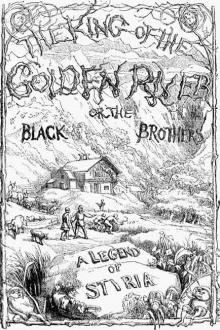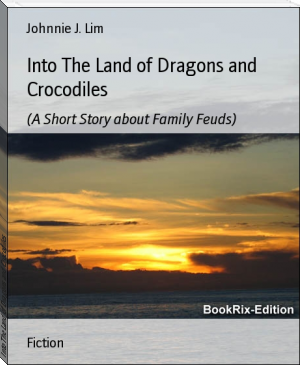The King of the Golden River or the Black Brothers - John Ruskin (free books to read TXT) 📗

- Author: John Ruskin
- Performer: -
Book online «The King of the Golden River or the Black Brothers - John Ruskin (free books to read TXT) 📗». Author John Ruskin
Then again the light seemed to fade from before his eyes, and he looked up, and, behold, a mist, of the colour of blood, had come over the sun; and the bank of black cloud had risen very high, and its edges were tossing and tumbling like the waves of the angry sea. And they cast long shadows, which flickered over Schwartz's path.
Then Schwartz climbed for another hour, and again his thirst returned; and as he lifted his flask to his lips, he thought he saw his brother Hans lying exhausted on the path before him, and, as he gazed, the figure stretched its arms to him, and cried for water. "Ha, ha," laughed Schwartz, "are you there? remember the prison bars, my boy. Water, indeed! do you suppose I carried it all the way up here for you?" And he strode over the figure; yet, as he passed, he thought he saw a strange expression of mockery about its lips. And, when he had gone a few yards farther, he looked back; but the figure was not there.
And a sudden horror came over Schwartz, he knew not why; but the thirst for gold prevailed over his fear, and he rushed on. And the bank of black cloud rose to the zenith, and out of it came bursts of spiry lightning, and waves of darkness seemed to heave and float between their flashes, over the whole heavens. And the sky where the sun was setting was all level, and like a lake of blood; and a strong wind came out of that sky, tearing its crimson clouds into fragments, and scattering them far into the darkness. And when Schwartz stood by the brink of the Golden River, its waves were black, like thunder clouds, but their foam was like fire; and the roar of the waters below, and the thunder above met, as he cast the flask into the stream. And, as he did so, the lightning glared in his eyes, and the earth gave way beneath him, and the waters closed over his cry. And the moaning of the river rose wildly into the night, as it gushed over the
TWO BLACK STONES.
CHAPTER V.HOW LITTLE GLUCK SET OFF ON AN EXPEDITION TO THE GOLDEN RIVER, AND HOW HE PROSPERED THEREIN; WITH OTHER MATTERS OF INTEREST.
When Gluck found that Schwartz did not come back, he was very sorry, and did not know what to do. He had no money, and was obliged to go and hire himself again to the goldsmith, who worked him very hard, and gave him very little money. So, after a month or two, Gluck grew tired, and made up his mind to go and try his fortune with the Golden River. "The little king looked very kind," thought he. "I don't think he will turn me into a black stone." So he went to the priest, and the priest gave him some holy water as soon as he asked for it. Then Gluck took some bread in his basket, and the bottle of water, and set off very early for the mountains.
If the glacier had occasioned a great deal of fatigue to his brothers, it was twenty times worse for him, who was neither so strong nor so practised on the mountains. He had several very bad falls, lost his basket and bread, and was very much frightened at the strange noises under the ice. He lay a long time to rest on the grass, after he had got over, and began to climb the hill just in the hottest part of the day. When he had climbed for an hour, he got dreadfully thirsty, and was going to drink like his brothers, when he saw an old man coming down the path above him, looking very feeble, and leaning on a staff. "My son," said the old man, "I am faint with thirst, give me some of that water." Then Gluck looked at him, and when he saw that he was pale and weary, he gave him the water; "Only pray don't drink it all," said Gluck. But the old man drank a great deal, and gave him back the bottle two-thirds empty. Then he bade him good speed, and Gluck went on again merrily. And the path became easier to his feet, and two or three blades of grass appeared upon it, and some grasshoppers began singing on the bank beside it; and Gluck thought he had never heard such merry singing.
Then he went on for another hour, and the thirst increased on him so that he thought he should be forced to drink. But, as he raised the flask, he saw a little child lying panting by the road-side, and it cried out piteously for water. Then Gluck struggled with himself, and determined to bear the thirst a little longer; and he put the bottle to the child's lips, and it drank it all but a few drops. Then it smiled on him, and got up, and ran down the hill; and Gluck looked after it, till it became as small as a little star, and then turned and began climbing again. And then there were all kinds of sweet flowers growing on the rocks, bright green moss, with pale pink starry flowers, and soft belled gentians, more blue than the sky at its deepest, and pure white transparent lilies. And crimson and purple butterflies darted hither and thither, and the sky sent down such pure light, that Gluck had never felt so happy in his life.
Yet, when he had climbed for another hour, his thirst became intolerable again; and, when he looked at his bottle, he saw that there were only five or six drops left in it, and he could not venture to drink. And, as he was hanging the flask to his belt again, he saw a little dog lying on the rocks, gasping for breath—just as Hans had seen it on the day of his ascent. And Gluck stopped and looked at it, and then at the Golden River, not five hundred yards above him; and he thought of the dwarf's words, "that no one could succeed, except in his first attempt"; and he tried to pass the dog, but it whined piteously, and Gluck stopped again. "Poor beastie," said Gluck, "it'll be dead when I come down again, if I don't help it." Then he looked closer and closer at it, and its eye turned on him so mournfully, that he could not stand it. "Confound the King and his gold too," said Gluck; and he opened the flask, and poured all the water into the dog's mouth.
The dog sprang up and stood on its hind legs. Its tail disappeared, its ears became long, longer, silky, golden; its nose became very red, its eyes became very twinkling; in three seconds the dog was gone, and before Gluck stood his old acquaintance, the King of the Golden River.
"Thank you," said the monarch; "but don't be frightened, it's all right;" for Gluck showed manifest symptoms of consternation at this unlooked-for reply to his last observation. "Why didn't you come before," continued the dwarf, "instead of sending me those rascally brothers of yours, for me to have the trouble of turning into stones? Very hard stones they make too."
"Oh dear me!" said Gluck, "have you really been so cruel?"
"Cruel!" said the dwarf, "they poured unholy water into my stream: do you suppose I'm going to allow that?"
"Why," said Gluck, "I am sure, sir—your majesty, I mean—they got the water out of the church font."
"Very probably," replied the dwarf; "but," and his countenance grew stern as he spoke, "the water which has been refused to the cry of the weary and dying, is unholy, though it had been blessed by every saint in heaven; and the water which is found in the vessel of mercy is holy, though it had been defiled with corpses."
So saying, the dwarf stooped and plucked a lily that grew at his feet. On its white leaves there hung three drops of clear dew. And the dwarf shook them into the flask which Gluck held in his hand. "Cast these into the river," he said, "and descend on the other side of the mountains into the Treasure Valley. And so good speed."
As he spoke, the figure of the dwarf became indistinct. The playing colours of his robe formed themselves into a prismatic mist of dewy light: he stood for an instant veiled with them as with the belt of a broad rainbow. The colours grew faint, the mist rose into the air; the monarch had evaporated.
And Gluck climbed to the brink of the Golden River, and its waves were as clear as crystal, and as brilliant as the sun. And, when he cast the three drops of dew into the stream, there opened where they fell, a small circular whirlpool, into which the waters descended with a musical noise.
Gluck stood watching it for some time, very much disappointed, because not only the river was not turned into gold, but its waters seemed much diminished in quantity. Yet he obeyed his friend the dwarf, and descended the other side of the mountains, towards the Treasure Valley; and, as he went, he thought he heard the noise of water working its way under the ground. And, when he came in sight of the Treasure Valley, behold, a river, like the Golden River, was springing from a new cleft of the rocks above it, and was flowing in innumerable streams among the dry heaps of red sand.
And as Gluck gazed, fresh grass sprang beside the new streams, and creeping plants grew, and climbed among the moistening soil. Young flowers opened suddenly along the river sides, as stars leap out when twilight is deepening, and thickets of myrtle, and tendrils of vine, cast lengthening shadows over the valley as they grew. And thus the Treasure Valley became a garden again, and the inheritance, which had been lost by cruelty, was regained by love.
And Gluck went, and dwelt in the valley, and the poor were never driven from his door: so that his barns became full of corn, and his house of treasure. And, for him, the river had, according to the dwarf's promise, become a River of Gold.
And, to this day, the inhabitants of the valley point out the place where the three drops of holy dew were cast into the stream, and trace the course of the Golden River under the ground, until it emerges in the Treasure Valley. And at the top of the cataract of the Golden River, are still to be seen TWO BLACK STONES, round which the waters howl mournfully every day at sunset; and these stones are still called by the people of the valley
THE BLACK BROTHERS.
PRESSWORK BY BERWICK & SMITH, BOSTON.
WENTWORTH & REED'SFIRST STEPS IN NUMBER.
A PRIMARY ARITHMETIC.
FROM PREFACE TO THE TEACHER'S EDITION.
The object of this book is to provide teachers with a record of the work done in number in the primary schools of to-day.
There has been no attempt at novelty in the subject-matter, in the arrangement of work, or in the manner of presentation. The whole is on a constructive basis. Numbers are chief; processes subordinate. What has been found to be more easily understood





Comments (0)